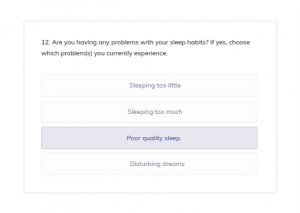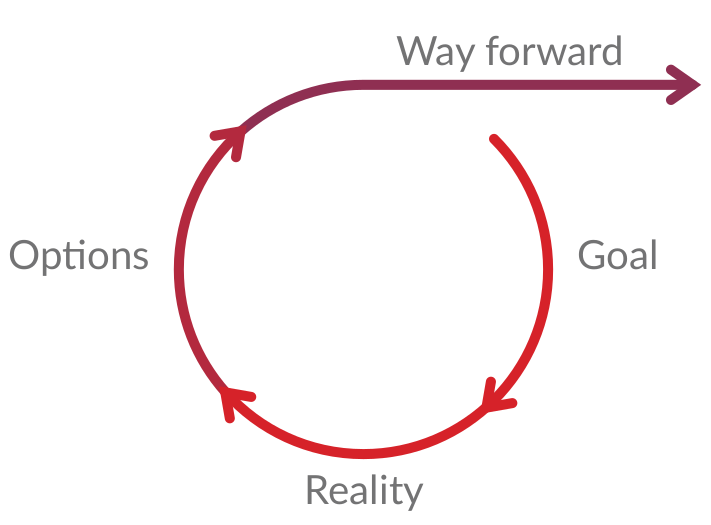100 Most Powerful Life Coaching Questions [+PDF]
 A great coach doesn’t give answers. Instead, they ask powerful questions to unlock and surface a better way forward for their clients.
A great coach doesn’t give answers. Instead, they ask powerful questions to unlock and surface a better way forward for their clients.
But what should you ask as a coach to get better outcomes, help others deal with challenges, and grow?
The ‘right’ questions will always vary depending on your context, but some common themes run through all coaching processes. In this article, we’ll look at why questions matter, what to ask, and how to help you help others.
See also: Therapy Questions Every Therapist Should Be Asking.
Before you read on, we thought you might like to download our three Positive Psychology Exercises for free. These science-based exercises will explore fundamental aspects of positive psychology including strengths, values and self-compassion and will give you the tools to enhance the wellbeing of your clients, students or employees.
This Article Contains:
- Why Ask Questions as a Coach?
- What Are Some Good Questions to Ask as a Life Coach?
- How To Ask Questions
- What are Grow Model Coaching Questions?
- What is Instructional Coaching?
- 23 Questions for Managers and Leaders
- 12 Questions to Ask When Coaching for Health
- 10 Questions to Ask as a Job or Career Coach
- 15 Narrative Coaching Questions & Answers to Look Out For
- Great Books With Coaching Questions
- About the Work of Tony Stoltzfus
- A Take-Home Message
- References
Why Ask Questions as a Coach?
Questions play a crucial role in coaching for several reasons. Throughout different stages of the development journey, they may serve different functions, but overall – questions invite the client to find the answers themselves.
Without any questions, coaching would be somewhat like giving instruction without raising awareness, lecturing without self-reflection, and it would be tough to spark the same accountability that drives results.
Asking questions and listening carefully to the responses allows a coaching conversation to flow properly in the right direction – whether that’s toward setting goals or planning specific actions.
They also allow you as a professional to stimulate some self-reflection in your client, giving them more in-depth insight into their values (“Why do I want this?”), their thought processes (“Why haven’t I tried X or Y before?”) and chart a path forward (“How can I get started?”). For life coaches, in particular, there are at least a few questions which have a place in every session.
What Are Some Good Questions to Ask as a Life Coach?
To be effective, a life coach needs to understand their client’s envisioned future and their existing situation. They also need to understand what they hold most meaningful in their lives – their values – and get a good overview of how to help their client overcome their perceived obstacles.
Understanding Your Client’s Mindset
What makes your client happy? What is it that they want more of in their life – and are they aware of what brings these positive emotions about?
These questions help you learn a little more about your client as a person, and can help them start thinking about creating more of these moments. They also help the client begin thinking about possible long-term life goals.
For instance:
- What is the happiest part of your daily routine?
- What are some things you feel grateful for?
- In the past week/month/year, what were your three most positive moments?
Establishing Direction
It is also useful to find out what your client hopes to achieve from their sessions with you; clarity helps you tailor your process to their time frame, whether it’s a longer sequence or a one-off meeting (Page, 2018).
- What do you hope to have accomplished by the end of our session(s) together?
- How will you specifically know what success looks like for you?
- What would be the most significant success you could hope for from our meeting?
Tapping into Values
Often, clients will be looking to solve a problem as well as achieve a goal. For instance, a client may feel he is not living up to the values he believes in by being an inattentive father. If you think it’s appropriate, you might dig just a bit deeper into these to tease out a compelling why – helping you later to gain commitment and motivation (Reardon, 2010).
With a little more time, it can also help to use a structured Values Assessment to pin down what your client considers important.
- What other aspects of your life do you feel will be improved by accomplishing this?
- How will your achieving this goal help others around you?
- Why is it important to you to accomplish your goal?
Encourage Self-Inquiry
Coaching is not about spoon-feeding answers; it’s about inviting the coachee to take a good look inside at their perspectives. Self-inquiry is vital in helping clients motivate, plan for barriers, and develop a persuasive rationale for action (Page, 2018).
- How do you feel you could best motivate yourself?
- What are the best ways for you to support yourself at this point?
- If you had no restrictions at all, who would you be?
When asking about or discussing a client’s goals, it helps to make it relevant. These questions are phrased generically, but should ideally be customized to the coachee. “How will achieving this goal enrich your life?” would thus become “How would becoming a professional builder enrich your life?”
Many life coaches choose to use some form of framework to structure their sessions, and the GROW Model is a well-known structured processes and one of the most popular available.
How To Ask Questions

Yet logistical challenges often become a stumbling block for continued coaching.
Whether it is time, social distancing, or remote locations, being able to connect with your client using a smart app, is the ideal solution for challenges that obstructs continued engagement.
Quenza is an online coaching application that allows you to assign customized questionnaires to your client, ensuring a continuous conversation and a simple way to ask questions. The client can answer these questions in the privacy of their home using the encrypted secure platform, which is GDPR and HIPAA compliant.
This smart app, which is cross-platform compatible, also provides multi-media support. Setting up a video session with your client to ask coaching questions face to face is easy and efficient.
In addition, the tool is fully customizable, allowing you to assign care pathways suited to each individual. As a coach, you can track their real-time progress and stay on top of their accomplishments.
To find out more about making this smart app an integral part of your coaching conversations, visit the Quenza website.
What are Grow Model Coaching Questions?
The GROW Model is a four-step framework that life coaches can use to help structure coaching sequences as a whole or to guide individual conversations with clients. It is an acronym, each letter representing a key stage:
Goal: Establishing a client’s overall objectives;
Reality: Understanding their current situation or “reality” before taking action;
Options/Opportunities: Looking into possible options they might pursue; and
Way Forward/What’s Next/Will: Deciding on the actions they will take going forward.
Source: Compassiontolead.net (2019)
Given that each stage has a distinct aim, a life coach will be required to ask different relevant questions as the process unfolds.
Goal
The core question of this first stage is What is your long-term goal?
This stage aims to tap into the personal values that underpin your client’s desires and create some clarity around what they want to achieve.
For example:
- What matters to you the most concerning this value/life domain?
- What are you keen to accomplish through this personal coaching sequence/session?
- What would you like to see happen?
- What is it specifically that you want to achieve?
- Describe your ideal outcome from this coaching…
- Tell me more about this perfect result?
- Why do you want to achieve this goal?
- What is the deeper meaning or personal significance that this goal has for you?
- What positive things do you feel will happen if you accomplish what you’re trying to achieve?
- Tell me how you will know if you’ve attained your desired outcome?
Current Reality
This primary question here is What is your context or situation right now?
In this next phase, your primary goal as a coach is to help your client gain more awareness of their existing situation. ‘Current Reality’ questions also help you understand a little more about where you’re starting from together so that you can help them as you progress.
Relevant GROW Model questions in this stage are designed to facilitate self-evaluation, helping your client discover what may have been standing in their way of achieving their goal. Active listening plays a vital role during this stage – as you probe deeper into a client’s responses, it’s not unusual to uncover thought patterns or schema that are worth challenging.
Questions may include:
- At this point, what’s happening now to you? What impact or influence is this having?
- Tell me more about this…with whom? Where? When?
- Have you tried doing anything thus far to achieve your goal?
- I’m curious about what you did… How did it go for you? Share some examples with me…
- Where do you feel you are now concerning your life goal? Would you be able to rank this out of 10?
- So far, what has helped your progress? What has held you back? Tell me about the last time this happened…
- What do you feel you need to achieve your goal?
- If you asked for this resource, what would happen?
- What could you do differently this time around?
- Has anybody you know achieved the same goal? How did they manage?
Options
The main underpinning question here is What are your options or opportunities for action?
GROW Model questions at the Options stage are focused on enabling your client to investigate different possible pathways, solutions, or routes to accomplishing their goal. It may be helpful to take a brainstorming approach here as you collaborate and pitch in with your ideas where necessary.
Possible questions include:
- What do you see as the first step to accomplishing your goal?
- What might you do to take you closer after that?
- Can you think of some alternatives? Is there another way?
- Who might you ask for help? Who else?
- In the past, what has worked for you? What did you learn from that?
- Tell me what you think would happen if you tried doing that?
- What are the pros and cons of this option?
- Which possible pathway do you feel prepared to go down?
- What would you do if time/money/resources weren’t an issue?
- How will you measure your progress using this option?
Will/What’s Next/Way Forward
The key questions of this stage are What will you do next? What’s the way forward?
Having generated multiple pathways for your client to pursue, it’s time to narrow it down to a single realistic option and garner commitment to it. Asking the right questions in this stage will help your client solidify an action plan and feel motivated to start following it.
Here are some questions that may help:
- Which opportunity are you going to pursue?
- What specific actions will you take to achieve your goal? What is your time frame?
- What are the steps you’re going to take? What’s the very first thing you will do?
- What are the next three steps? What else?
- Have you considered the potential barriers?
- Tell me how you plan to overcome these obstacles…
- Who will you ask to help you along the way? What else will you need?
- How committed do you feel to this particular opportunity, out of 10?
- What are some ways you can get to 10?
- How are you going to know that you’ve succeeded?
With plenty of potential questions prepared, it becomes much easier for coaches to adapt to a client’s needs. For the GROW Model to be implemented successfully, it’s important to use it as a guideline and to appreciate that no conversation ever flows seamlessly.
What is Instructional Coaching?
Unlike life coaching, instructional coaching is a content-based approach to development that is intended to develop teachers. Content-based means that instructional coaching may cover specific topics such as literacy or maths; its goal is to positively impact student outcomes through the professional development of educators (Cornett & Knight, 2009).
Instructional coaches require substantial training, but findings show that the results can have a broad and significant impact. Among these impacts, instructional coaching has been linked to enhanced self-efficacy in educators and more positive teacher attitudes (Vogt & Rogalla, 2009).
Instructional coaching is not directly related to positive psychology, but it draws on the same core concept of helping others realize their full potential – in this case, as educators.
23 Questions for Managers and Leaders
Workplace coaching can involve set one-on-one sessions with employees, following a structured sequence such as the GROW Model, Kolb’s Experiential Learning Cycle, or any number of frameworks.
As leaders gain coaching experience, however, they also tend to find these questions a useful way of helping others develop – by working them into everyday conversations.
Clarifying Goals
Many coaching models take a results-focused approach by beginning with the goal in mind. Questions include (Harvard Business Review, 2014; HR Gazette, 2019; Lipovsky, 2019):
- What is one key thing you want to achieve at this moment?
- What are the three areas you wish to develop, enhance, or grow?
- What do you see as the real challenge right now?
- Imagine you’ve just ended the perfect week at work. What outcomes make you proudest?
- In what specific areas would you like to be at your professional best?
Open-ended ‘probing’ questions also come in handy when exploring the reasons behind a goal or challenge:
- Describe this goal or challenge a bit more…
- What are some ways this challenge is impacting you or others?
- Tell me about why you see this as an ideal professional outcome?
- Help me understand why this change is particularly meaningful to you?
- Could you tell me how this would help you and your team achieve its mission?
Generating Solutions
- What do you think would be a good first step?
- What has worked for you in the past when it comes to your professional growth?
- How might you draw on that same approach in this case?
- What do you feel you should do differently?
- Tell me about the resources that would be helpful? How or where might you acquire those?
If previous approaches have not been successful, leaders can help by encouraging their co-worker to think outside the box.
- What would you do if resources were not a concern?
- What else can you think of?
- How might you broaden your current line of thinking?
Encouraging Accountability, Commitment, and Motivating Action
- What are some concrete steps you could take to achieve this goal?
- How might you turn these steps into a plan?
- What will success look like? How will you know you’ve achieved your goal?
- How will you prepare for each step?
- How do you plan to motivate yourself when obstacles arise? What are some ways to motivate yourself to get started?
It’s critical to remember that these questions are intended to spark a guided discussion and that listening plays a crucial role in the coaching conversation that follows. There will always be points in a conversation where a leader needs to suggest alternatives, challenge an employee’s thinking, or offer resources to help them develop a viable plan.
How to coach (by asking questions) – Winning by Design
12 Questions to Ask When Coaching for Health
Leaders and life coaches aren’t the only professionals who can benefit from asking coaching questions. In the healthcare industry, “coaching for health” refers to an evidence-based approach that aims to empower rather than simply inform clients about their physical wellbeing (Rogers & Maini, 2016).
In a clinical context, coaching also tries to:
- Help patients self-motivate by looking at the values that relate to their health;
- Encourage behavioral change, by having clients consider the health-related outcomes of their actions; and
- Facilitate greater mental wellbeing in both practitioners and patients through a more positive relationship.
Coaching for health can also involve frameworks; T-GROW is one example. A variant of the popular GROW model, T-GROW stands for Topic, Goal, Reality, Options, and What Next. Example questions include (Coachingforhealth.org, 2019):
- What is your focus for today? (Topic)
- What is it you’d like to get from our conversation? (Topic)
- What matters the most to you regarding this? (Goal)
- What do you imagine it would look like if you could accomplish this? (Goal)
- Describe the existing situation… (Reality)
- What do you think you will need to do? (Reality)
- Have you successfully handled a similar situation before? (Reality)
- What might your family or friends suggest that you do? (Options)
- What can you control about this situation? (Options)
- What advice would you give someone else in a similar situation? (Options)
- What’s your next step after today? (What Next)
- How can you keep yourself on track with this? (What Next)
Jenny Rogers’ book Coaching for Health: Why it works and how to do it is an excellent potential resource for clinicians wanting to learn more about the practice.
10 Questions to Ask as a Job or Career Coach
Career coaching questions are similar in some respects to life coaching questions and different in others. Whereas life coaching questions can be related to a range of domains: emotions, relationships, health, family, or similar, career coaching is focused on job-related ambitions, looking at aspects such as performance, skills, future direction, and professional aspirations, among others.
Regardless, career coaches are still required to help foster self-awareness in their coachees – the accountability still rests with the co-worker who is looking for some direction. Similar to life coaching, career coaching will typically involve:
- Setting objectives and determining priorities;
- Developing a positive mindset;
- Challenging unhelpful thought patterns;
- Helping to change unproductive behaviors;
- Strength-spotting; and
- Fostering motivation.
With these in mind, the following questions may be helpful (Lancer et al., 2016).
- What matters the most to you in your professional life? What do you believe passionately in?
- What skills, talents, or competencies do you have that you are most proud of? Which make you the happiest? Which make you feel accomplished?
- What would you love to be able to list on your ideal resume? How about if there were no barriers or boundaries?
- Describe the last time you felt driven and motivated by your role (current or past). What were you doing? Who was around? Where were you?
- When trying to learn a skill you’re passionate about, what are some barriers you’ve faced? How did you overcome these? Which did you need help with?
- What do you feel is preventing you from learning the knowledge you’re after? Have you asked anyone else for help? If so, what happened?
- What is one step you could take to get you closer to that career goal? What kind of development or opportunities might you need to make that step? What opportunities can you create by yourself?
- What can you practically achieve between now and next week/month/quarter to take you closer to your goal?
- How would you go about achieving your career goal if you had unlimited resources? What is already possible right now?
- Have you told others around you about your career goals? Has anyone achieved a similar objective?
As you have probably noticed, there is a similar theme running through these and other coaching questions in other domains. Great coaching is about empowering your client to find the answers themselves, whether that means looking at their professional skills or their whole lives in a different light.
15 Narrative Coaching Questions & Answers to Look Out For
Narrative coaching was developed by Dr. David Drake of the Moment Institute. It is (Drake, 2019):
“...a mindful, experiential, and holistic approach that helps people shift their stories about themselves, others, and life itself to create new possibilities and new results.”
With narrative coaching, a client is invited to become more attuned to the stories they tell themselves and let go of those which are unhelpful. By doing so, they are encouraged to create more useful narratives. Six key principles guide the practice; these include the following:
- That everything a coach needs is right in front of them;
- That they should try to be fully present to reality without judgment;
- Speaking is only valuable when it offers something better than silence;
- The emphasis is on encouraging experiences rather than explanations; and
- That clients should remain actively connected and engaged with whatever they have externalized while they work with it.
The role of the coach is first to help clients become aware of where they are situated in their stories by asking Situate questions such as:
- Describe what you can observe…
- What did you say to yourself or tell yourself at that point?
- What did you then do?
- How did it end?
Next, a coach helps them gain clarity on what they are looking for from the session. This informs how things unfold by establishing a purpose and direction for your time together. This Search phase can include questions such as:
- What is it you want to change, and why?
- What is driving you to do it a different way?
- What would you prefer to have as an alternative ending to this story?
- What would need to change in your perspectives to accomplish that alternative outcome?
The third phase of narrative coaching is called the Shift phase, during which a client readies themselves to leave the old story behind. Because clients come to the coaching session with a question (conscious or subconscious), a coach then helps them experiment with new stories that they want to create.
For example:
- What do you feel is in the way of you making this change?
- What will you need in place to get started?
- What past experiences can you draw from to help you make this pivot?
- What can you do instead of [what you’ve done before]?
Finally, a narrative coach should try to integrate the changes their client has experimented with – creating a new narrative which they can tell themselves the next time a similar situation arises. Sustain phase questions are about making plans and identifying ways to deal with challenges that may occur. They include:
- What obstacles do you feel could come your way?
- How could you work with these challenges and experience your new narrative?
- How will this story support you to change?
You’ll find more on narrative coaching in David Drake’s book Narrative Coaching: The Definitive Guide to Bringing New Stories to Life.
Great Books With Coaching Questions
- The Coaching Habit: Say Less, Ask More & Change the Way You Lead Forever – Michael Bungay Stanier (Amazon)
- Coaching Questions: A Coach’s Guide to Powerful Asking Skills – Tony Stoltzfus (Amazon)
- An Introduction to Coaching Skills: A Practical Guide – Christian van Nieuwerburgh (Amazon)
- Life Coaching Activities & Powerful Questions – Phyllis Reardon (Amazon)
- Positive Psychology Coaching: Putting the Science of Happiness to Work for Your Clients – Robert Biswas-Diener and Ben Dean (Amazon)
- The Life Coaching Handbook: Everything you need to be an effective life coach – Curly Martin (Amazon)
- Coaching Questions: 101 Coaching Questions for the Coach and the Coaching Client for an Empowering Coaching Session – Randy Wayne (Amazon)
- Coaching For Health: Why It Works And How To Do It – Jenny Rogers and Arti Maini (Amazon)
- Narrative Coaching: Bringing our New Stories to Life – David Drake (Amazon)
For further reading, we share the top Life Coaching Books, as well as the Ultimate Life Coaching Tools Library.
About the Work of Tony Stoltzfus
Christian life coach and trainer Tony Stoltzfus is the author of several popular books on the topic, including Coaching Questions: A Coach’s Guide to Powerful Asking Skills. As a master coach trainer, he’s also established an international school for practitioners and has a bookstore at Coach22.com.
His books – and we’ve linked to one just above – are aimed at life coaches and leaders; they combine practical coaching tools with interactive questioning techniques to facilitate long-term change. Stoltzfus’ popular book, Coaching Questions, provides useful overviews of some critical theory which will be familiar to therapists – such as reframing and challenging – as well as over a thousand example questions.
A Take-Home Message
Whether you’re a life coach, career, performance, or even an instructional coach, it’s essential to ask the right questions to move your client toward success. Coupled with active listening, a curiosity to dig deeper, and a genuine desire to help others, coaching questions can be a powerful way of sparking positive behavior in the right direction.
If you’ve got certain questions that you’d like to share with other career coaches, please do let us know in the comments section. We’d love to hear them!
We hope you enjoyed reading this article. Don’t forget to download our three Positive Psychology Exercises for free.
- Coachingforhealth.org. (2019). T-G.R.O.W: Useful Questions. Retrieved from https://www.coachingforhealth.org/wp-content/uploads/2016/10/TGROWUsefulQuestions.pdf
- Cornett, J., & Knight, J. (2009). Research on coaching. In J. Knight (Ed.). Coaching: Approaches and perspectives (pp. 192-216). Thousand Oaks, CA: Corwin Press.
- Drake, D. B. (2010). Narrative coaching. The complete handbook of coaching, 120-131.
- Drake, D. B. (2019). What Is Narrative Coaching? Retrieved from https://narrativecoaching.com/what-is-narrative-coaching
- Harvard Business Review. (2014). HBR Guide to Coaching Employees. Harvard Business Review.
- HR Gazette. (2019). 30 Awesome Coaching Questions for Leaders. Retrieved from https://hr-gazette.com/30-awesome-coaching-questions-for-leaders/
- Lancer, N., Clutterbuck, D., & Megginson, D. (2016). Techniques for coaching and mentoring. Routledge.
- Lipovski, T. (2019). 43 Coaching Questions That Will Make You a Better Leader. Retrieved from https://www.reflektive.com/blog/coaching-questions/
- Page, C. (2018). My Top 20 Life Coaching Questions. Retrieved from https://www.innerlifeskills.com/life-coaching-tools/my-top-20-coaching-questions/
- Reardon, E. (2010). Life Coaching Activities and Powerful Questions. St. John’s, NL, Canada: CoachPhyllis. com. Inc. Rosen, K, 10.
- Rogers, J., & Maini, A. (2016). Coaching for Health: Why it Works and how to Do it. Open University Press.
- Vogt, F., & Rogalla, M. (2009). Developing adaptive teaching competency through coaching. Teaching and Teacher Education, 25, 1051-1060.
Let us know your thoughts
Read other articles by their category
- Body & Brain (49)
- Coaching & Application (57)
- Compassion (26)
- Counseling (51)
- Emotional Intelligence (24)
- Gratitude (18)
- Grief & Bereavement (21)
- Happiness & SWB (40)
- Meaning & Values (26)
- Meditation (20)
- Mindfulness (45)
- Motivation & Goals (45)
- Optimism & Mindset (34)
- Positive CBT (28)
- Positive Communication (20)
- Positive Education (47)
- Positive Emotions (32)
- Positive Leadership (18)
- Positive Parenting (4)
- Positive Psychology (33)
- Positive Workplace (37)
- Productivity (16)
- Relationships (46)
- Resilience & Coping (36)
- Self Awareness (21)
- Self Esteem (38)
- Strengths & Virtues (32)
- Stress & Burnout Prevention (34)
- Theory & Books (46)
- Therapy Exercises (37)
- Types of Therapy (64)






What our readers think
very useful
Very usefull article, i liked it Thank you.
Very useful articles and good questions, it has really helped to make a firm decision on starting my coaching.